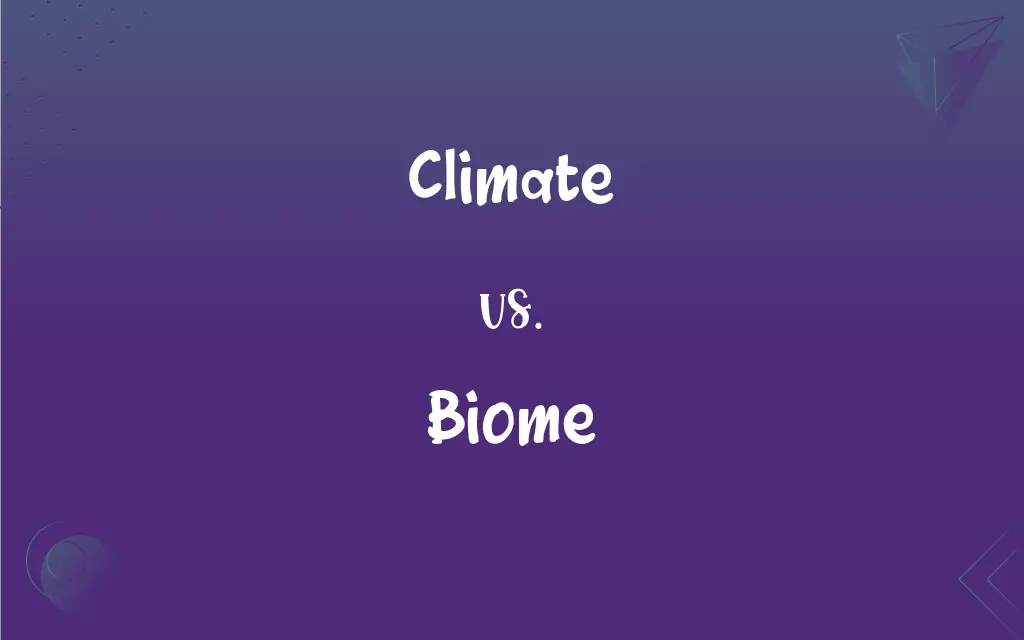Climate vs. Biome: What's the Difference?
Edited by Aimie Carlson || By Harlon Moss || Published on December 16, 2023
"Climate" is the average weather conditions in an area over a long period, while "biome" is a large ecological area with distinct animal and plant life adapted to its environment.

Key Differences
Climate refers to the long-term patterns of temperature, humidity, wind, and rain in a region. A biome is a large ecosystem characterized by its vegetation, soil, climate, and wildlife.
The climate of an area influences its biome, but a biome is more than its climate; it includes specific flora and fauna adapted to it. Biomes encompass the living organisms within a geographical area defined by its climate.
Climates can range from dry deserts to humid rainforests, determining the type of biome that can exist in that region. Biomes, such as forests, deserts, and grasslands, are defined by their unique ecological conditions.
Climate classifications, like tropical, temperate, and polar, describe the weather patterns of an area. Biome classifications focus on the types of life forms that thrive in those climates, like tundra or savanna.
The study of climate involves understanding atmospheric conditions over time. In contrast, studying biomes involves examining the interactions between climate, soil, and living organisms.
ADVERTISEMENT
Comparison Chart
Definition
Average weather conditions in an area over a long period.
A large ecological area with distinct plant and animal life.
Focus
Temperature, humidity, precipitation, and wind patterns.
Types of vegetation and animal life adapted to specific climates.
Determining Factors
Atmospheric conditions and geographical location.
Combination of climate, soil, and living organisms.
Classifications
Tropical, temperate, arid, polar, etc.
Forests, deserts, grasslands, tundra, etc.
Study Concerns
Weather patterns, climate change, and atmospheric science.
Ecosystem functioning, biodiversity, and ecological relationships.
ADVERTISEMENT
Climate and Biome Definitions
Climate
A region with particular prevailing weather conditions.
She moved to a warmer climate for health reasons.
Biome
An area of the planet that can be classified according to the plants and animals that live in it.
The Sahara Desert is one of the harshest biomes on Earth.
Climate
The prevailing trend of public opinion or another aspect of public life.
The political climate has become more polarized.
Biome
A community of plants and animals with common characteristics for the environment they exist in.
Tundra is a biome characterized by its cold, harsh conditions.
Climate
The weather conditions prevailing in an area in general or over a long period.
The climate in the region is generally hot and dry.
Biome
A large naturally occurring community of flora and fauna.
The coral reef biome is home to a variety of marine life.
Climate
The composite or generally prevailing weather conditions of a region.
The island has a tropical marine climate.
Biome
A large community of plants and animals that occupies a distinct region.
The Amazon rainforest is a richly diverse biome.
Climate
The average course or condition of the weather at a place usually over a period of years.
The city's climate is characterized by mild winters and hot summers.
Biome
A major ecological community type.
Grasslands are a biome found in regions with moderate rainfall.
Climate
The meteorological conditions, including temperature, precipitation, and wind, that characteristically prevail in a particular region.
Biome
A major regional or global biotic community, such as grassland or desert, characterized chiefly by its prevailing climate and vegetation.
Climate
A region of the earth having particular meteorological conditions
Lives in a cold climate.
Biome
Any major regional biological community such as that of forest or desert.
Biome
All the genomes of such a community.
Biome
A specific type of complex ecological community characterized by specific environmental conditions and a distinctive group of plants and animals, maintained in a relatively stable equilibrium, such as a rain forest biome or prairie biome.
Biome
A particular region which is a biome{1}.
Biome
A major biotic community characterized by the dominant forms of plant life and the prevailing climate
FAQs
Are biomes static?
No, they can change over time due to environmental factors.
Is climate only about temperature?
No, it includes humidity, precipitation, and wind patterns as well.
Can a biome span multiple climates?
Yes, some biomes like forests can exist in different climate zones.
Can human activities affect climate?
Yes, activities like deforestation and burning fossil fuels impact climate.
How many climate types are there?
There are several, including tropical, temperate, and polar.
Are aquatic ecosystems considered biomes?
Yes, like marine and freshwater biomes.
Does climate refer to daily weather?
No, it refers to long-term weather patterns.
Does climate change affect biomes?
Yes, changes in climate can alter the characteristics of a biome.
Do biomes influence biodiversity?
Yes, different biomes support diverse forms of life.
Are all deserts hot biomes?
No, some deserts, like the Gobi, are cold.
Is climate change a natural process?
It can be both natural and influenced by human activities.
Does altitude affect climate?
Yes, higher altitudes generally have cooler climates.
Can a biome be found in different continents?
Yes, similar biomes can be found in different geographical locations.
What's the largest biome on Earth?
The marine biome, covering oceans.
Can technology predict climate change?
Technology helps in modeling and predicting climate patterns.
Are climate zones the same as biomes?
No, climate zones are broader categorizations.
Do biomes affect local economies?
Yes, through agriculture, tourism, and natural resources.
Is a rainforest a type of biome?
Yes, it's a biome characterized by high rainfall and diverse life.
Can climates be artificially created?
Yes, in controlled environments like greenhouses.
Are there man-made biomes?
Yes, like urban and agricultural biomes.
About Author
Written by
Harlon MossHarlon is a seasoned quality moderator and accomplished content writer for Difference Wiki. An alumnus of the prestigious University of California, he earned his degree in Computer Science. Leveraging his academic background, Harlon brings a meticulous and informed perspective to his work, ensuring content accuracy and excellence.
Edited by
Aimie CarlsonAimie Carlson, holding a master's degree in English literature, is a fervent English language enthusiast. She lends her writing talents to Difference Wiki, a prominent website that specializes in comparisons, offering readers insightful analyses that both captivate and inform.






































































